现代大学英语第二册lesson4_background information
现代大学英语第二版精读2 unit 4课文翻译
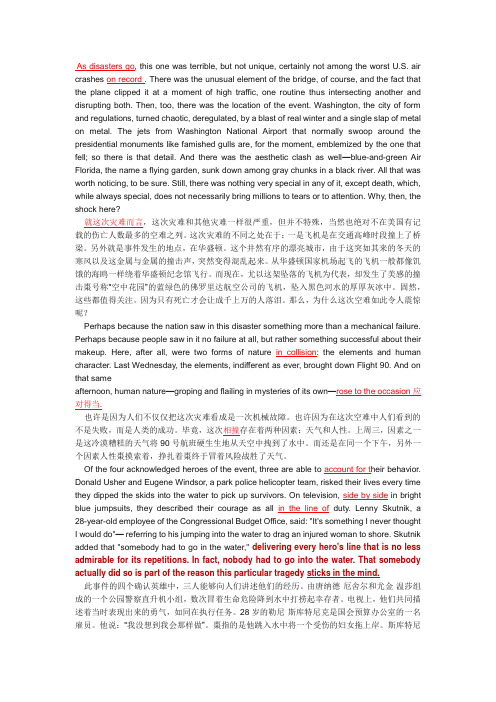
the plane clipped it at a moment of high traffic, one routine thus intersecting another and disrupting both. Then, too, there was the location of the event. Washington, the city of form and regulations, turned chaotic, deregulated, by a blast of real winter and a single slap of metal on metal. The jets from Washington National Airport that normally swoop around the presidential monuments like famished gulls are, for the moment, emblemized by the one that fell; so there is that detail. And there was the aesthetic clash as well—blue-and-green Air Florida, the name a flying garden, sunk down among gray chunks in a black river. All that was worth noticing, to be sure. Still, there was nothing very special in any of it, except death, which, while always special, does not necessarily bring millions to tears or to attention. Why, then, the shock here?就这次灾难而言,这次灾难和其他灾难一样很严重,但并不特殊,当然也绝对不在美国有记载的伤亡人数最多的空难之列。
现代大学英语(第二版)Unit4 Lions and Tigers and Bears

Lions and Tigers and Bears
Three different roles in life
Editor Author Cook
Xi’an Jia9/12/28
Lions and Tigers and Bears
Xi’an Jiaotong University
Lions and Tigers and Bears
Night here is silent, but not peaceful…
2019/12/28
The night in the Central Park
Lions and Tigers and Bears
The Ramble (漫步园)
Xi’an Jiaotong University
jewelsglitteringdisplaycasecrystalglassessparklingfewstarstwinklingfaintlydeepbluenightskygeneralverbslookseewatchidentifywordsscan细查扫视glimpse瞥见简短的一瞥glare怒目而视stare凝视gaze集中注意力看凝视glance粗略地看一下扫视peep窥视偷窥peek瞥一眼偷窥peer细看iii
Frederick Law Olmsted
Calvert Vaux
Lions and Tigers and Bears
Xi’an Jiaotong University
Robert Moses (1888—1981) was a New York state and municipal official whose ambitious public works projects of the 1930s, 1940s and 1950s transformed the urban landscape of New York City. He expanded the State’s park system and built numerous parkways and hundreds of new playgrounds and parks and important highways, bridges and tunnels linking the boroughs of New York City.
现代大学英语精读2unit4单词
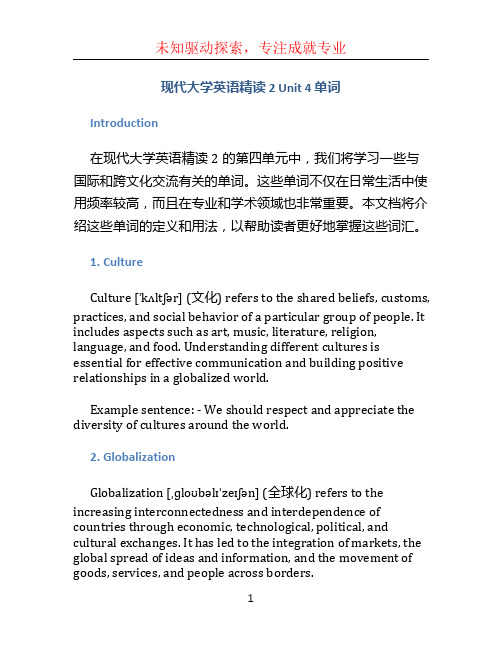
现代大学英语精读2 Unit 4 单词Introduction在现代大学英语精读2的第四单元中,我们将学习一些与国际和跨文化交流有关的单词。
这些单词不仅在日常生活中使用频率较高,而且在专业和学术领域也非常重要。
本文档将介绍这些单词的定义和用法,以帮助读者更好地掌握这些词汇。
1. CultureCulture [ˈkʌltʃər] (文化) refers to the shared beliefs, customs, practices, and social behavior of a particular group of people. It includes aspects such as art, music, literature, religion, language, and food. Understanding different cultures is essential for effective communication and building positive relationships in a globalized world.Example sentence: - We should respect and appreciate the diversity of cultures around the world.2. GlobalizationGlobalization [ˌɡloʊbəlɪˈzeɪʃən] (全球化) refers to the increasing interconnectedness and interdependence of countries through economic, technological, political, and cultural exchanges. It has led to the integration of markets, the global spread of ideas and information, and the movement of goods, services, and people across borders.Example sentence: - Globalization has both positive and negative impacts on the economy and society.3. CommunicationCommunication [kəˌmjuːnɪˈkeɪʃən] (交流) is the process of exchanging information, ideas, thoughts, and feelings between individuals or groups. It can be verbal, nonverbal, written, or visual. Effective communication requires clarity, understanding, and active listening.Example sentence: - Good communication skills are essential in the workplace for effective teamwork and collaboration.4. InterculturalIntercultural [ˌɪntərˈkʌltʃərəl] (跨文化的) refers to interactions between people or groups from different cultures. It involves understanding, appreciating, and adapting to cultural differences to foster effective communication and build positive relationships.Example sentence: - Intercultural competence is crucial for suc cess in today’s globalized world.5. Language BarrierLanguage barrier [ˈlæŋɡwɪdʒ ˈbæriər] (语言障碍) refers to the difficulty or obstacle in communication that arises when people, who speak different languages, cannot understand eachother. It can hinder effective communication, understanding, and collaboration.Example sentence: - The language barrier was a significant challenge during the international conference.6. StereotypeStereotype [ˈsteriəˌtaɪp] (刻板印象) refers to a fixed, oversimplified, and generalized belief or idea about a particular group of people or things. Stereotypes are often based on limited knowledge, prejudices, or cultural biases, and can lead to misunderstanding, discrimination, and unfair treatment.Example sentence: - It is important to challenge and overcome stereotypes to promote inclusivity and diversity.7. SensitivitySensitivity [sɛnˈsɪtɪvəti] (敏感) refers to the ability to perceive and understand the feelings, emotions, and needs of oneself and others. In intercultural communication, sensitivity helps to bridge cultural differences, avoid misunderstandings, and promote empathy and respect.Example sentence: - Sensitivity to cultural nuances is crucial when working with people from different backgrounds.8. Cross-culturalCross-cultural [ˌkrɔsˈkʌltʃərəl] (跨文化的) refers to interactions or experiences that involve more than one culture. It requires awareness, understanding, and adaptability to effectively navigate and communicate across different cultural contexts.Example sentence: - Cross-cultural communication skills are necessary for international business negotiations.9. EtiquetteEtiquette [ˈɛtɪˌkɛt] (礼仪) refers to the social norms, conventions, and acceptable behavior in a particular society or culture. Understanding and following etiquette helps to show respect, politeness, and consideration towards others in different social and cultural settings.Example sentence: - It is essential to be aware of the etiquette practices when attending a formal dinner in a foreign country.10. DiversityDiversity [daɪˈvɜːrsɪti] (多样性) refers to the range of different cultures, ethnicities, religions, perspectives, and identities within a group or society. Embracing diversity promotes inclusivity, equality, and understanding among people from different backgrounds.Example sentence: - The university campus celebrates diversity through various cultural events and programs.Conclusion掌握这些与国际和跨文化交流相关的单词对于现代大学英语学习非常重要。
现代大学英语精读第二UnitSayYes
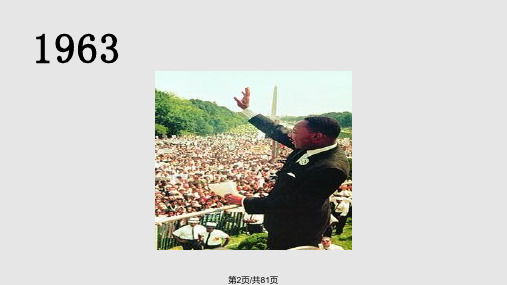
I. On the Origin of Racism
Debates over the origins of racism often suffer from a lack of _c_la_r_it_y over the term. Many mix recent forms of racism with earlier forms of ethnic and national conflict. In most cases ethno-national conflict seems to _o_w_e_ to conflict over land and strategic resources. In some cases ethnicity and nationalism were _h_ar_n_e_s_s_e_d to wars between great religious empires (for example, the Muslim Turks and the Catholic Austro-Hungarians). As Benedict Anderson has suggested ethnic _id_e_n_t_it_y and ethno-nationalism became a source of conflict within such empires with the rise of print-capitalism.
It don't matter if you're black white or yellow, if your brown or red let's get down to that love is color-blind you're my brother, you're my friend all that matters in the very end is to understand love is color-blind
现代大学英语第二版第二册课后翻译

It was wrong to raise our children the way we grow flowers in the greenhouse. We must expose them to all social problems because very soon they will be dealing with them as responsible citizens.随着时间的推移,我们不可避免地会越来越多地卷入国际事务。
而冲突必然会发生,因为国家之间总有不同的观点和利益。
As time goes on we are inevitably going to get more and more involved in international affairs. And conflicts are sure to occur because there always exists different views and interests among nations我们为我们的成就而骄傲,我们有理由感到骄傲。
但是我们永远不能变得狂妄,不然我们就会失去我们的朋友。
We are proud of our accomplishments, and we have reason to be. But we must never become arrogant. Otherwise we will lose our friends.信息现在唾手可得。
一个普通的电脑就能储存一个普通图书馆的信息。
Information is now easily available. An average computer can store the information of a small library.那家建筑公司没有资格操作这个项目。
他们没有任何法律文件能证明他们具备必要的专门技术。
我们必须找一个专门建造歌剧院的公司。
现代大学英语精读2课件ppt
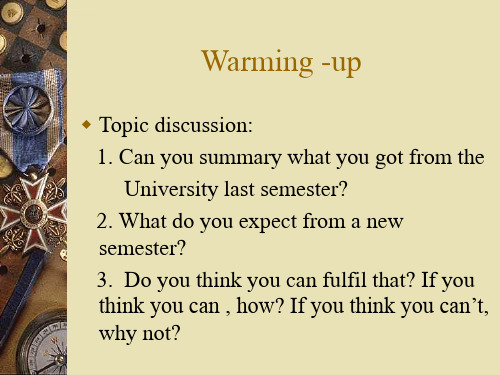
Warming -up
Topic discussion: 1. Can you summary what you got from the University last semester? 2. What do you expect from a new semester? 3. Do you think you can fulfil that? If you think you can , how? If you think you can’t, why not?
---- Mark Twain
从使用情况来看,闭胸式的使用比较 广泛。 敞开式 盾构之 中有挤 压式盾 构、全 部敞开 式盾构 ,但在 近些年 的城市 地下工 程施工 中已很 少使用 ,在此 不再说 明。
Text analysis
What did the writer do after he was fresh from graduate school?
Topic discussion
Suggested answers:
1. To give Ss sufficient training for a career. 2. To expose Ss to the essence of human
civilization 3. To cultivate the qualities of being a human 4. To gather useful information and knowledge 5. To encourage intellectual curiosity and cultural
现代大学英语(第2版)精读4教材全解
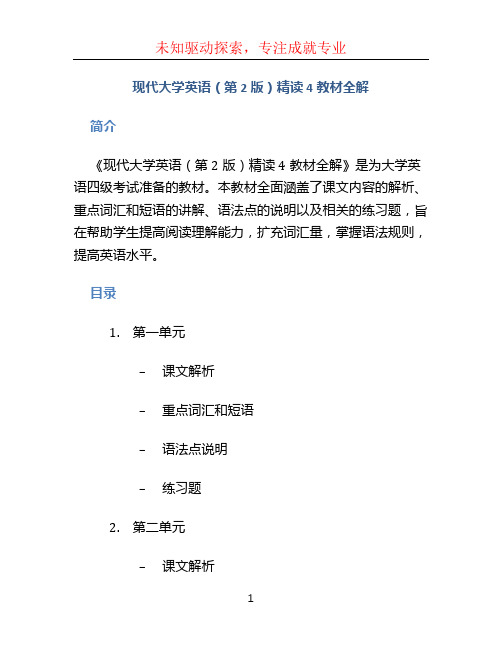
现代大学英语(第2版)精读4教材全解简介《现代大学英语(第2版)精读4教材全解》是为大学英语四级考试准备的教材。
本教材全面涵盖了课文内容的解析、重点词汇和短语的讲解、语法点的说明以及相关的练习题,旨在帮助学生提高阅读理解能力,扩充词汇量,掌握语法规则,提高英语水平。
目录1.第一单元–课文解析–重点词汇和短语–语法点说明–练习题2.第二单元–课文解析–重点词汇和短语–语法点说明–练习题3.第三单元–课文解析–重点词汇和短语–语法点说明–练习题4.第四单元–课文解析–重点词汇和短语–语法点说明–练习题第一单元课文解析第一单元的课文是《The Benefits of Gardening》。
本节课文主要讲述了园艺的好处。
文章明确指出园艺可以提供休闲和锻炼身体的机会,帮助人们放松心情,缓解压力。
同时,通过园艺,人们可以培养耐心和责任感。
此外,园艺也有助于改善环境,增加绿色空间。
重点词汇和短语•gardening:园艺•benefits:好处•leisure:闲暇•physical exercise:身体锻炼•relaxation:放松•stress relief:缓解压力•patience:耐心•responsibility:责任感•environmental improvement:环境改善•green space:绿色空间语法点说明在本节课文中,出现了一些语法点需要注意。
1.定冠词的使用:在英语中,名词前面需要加上定冠词。
例如,在句子。
大学英语精读第二册第四课课件

Text interpretation
Answer the questions
Comprehension Ex 2 on p.83
What type is the text, generally? A. narration B. exposition C. description D. argumentation
The Professor and the Yo-yo
Useful expressions Text interpretation Word family Sentence structure Translation Reading skill Guided writing Homework
Useful expressions
适中的价格 减轻疼痛 液晶显示器 保持平衡 环球旅行 简体中文 知识分子 A modest price Ease the pain LCD Keep balance Universal travel Simplified Chinese Intellectuals
Useful expressions
Hale Waihona Puke Text interpretation
9. He was beyond any pretension. 10. Material things meant nothing to him. 11. He believed in simplicity, so much so that… 12. When I suggested that he try shaving cream… 13. …I presented him with a tube of shaving cream. 14. … he was beaming with the pleasure of… 15. Then he reverted to using plain water. 16. He didn’t have the slightest interest in … 17. …a toy, a bird that balanced on the edge of a bowl of water…
现代大学英语精读第二版book2unit4
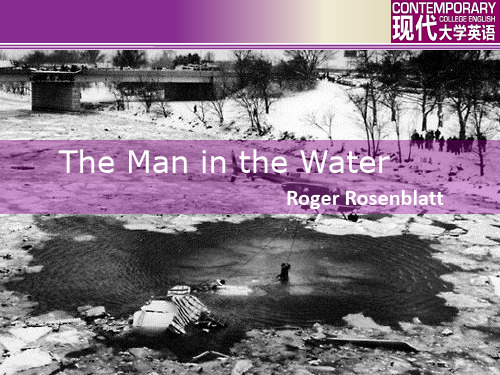
• Match the words with their correct meaning in the text.
1. aesthetic 2. chaotic 3. commitment 4. standoff 5. impact a. a determination to do what one considers to be his duty b. being central or most important c. a situation in which neither side in a fight can gain an advantage d. the force of one object striking or hitting another e. concerning beauty, esp. beauty in art f. a stop or pause g. in a state of complete disorder and confusion
Background
Genre
– What kind of article do we have for this lesson? Where do we generally find it? – What does this article concentrate on? Does it focus on the description of the disaster or how people are saved? Why?
Background News Feature
• A news feature does not cover all the details a news report has to contain and only focuses on certain aspects of the event on which the reporter has something to say. Though the details about the news event have to be true and exact, the reporter can add his/her own comment and interpretation of the event, which he/she is not allowed in a news report.
最新现代大学英语第二版精读2 unit 4课文翻译
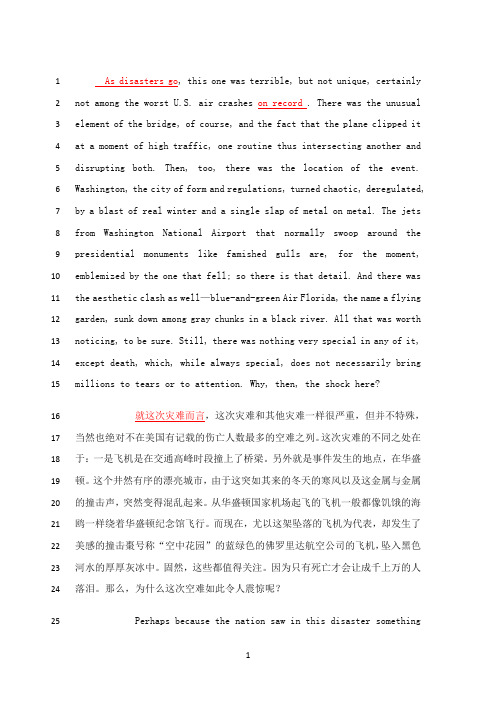
12element of the bridge, of course, and the fact that the plane clipped it 3at a moment of high traffic, one routine thus intersecting another and 4disrupting both. Then, too, there was the location of the event. 5Washington, the city of form and regulations, turned chaotic, deregulated, 6by a blast of real winter and a single slap of metal on metal. The jets 7from Washington National Airport that normally swoop around the 8presidential monuments like famished gulls are, for the moment, 9emblemized by the one that fell; so there is that detail. And there was 10the aesthetic clash as well—blue-and-green Air Florida, the name a flying 11garden, sunk down among gray chunks in a black river. All that was worth 12noticing, to be sure. Still, there was nothing very special in any of it, 13except death, which, while always special, does not necessarily bring 14millions to tears or to attention. Why, then, the shock here?1516当然也绝对不在美国有记载的伤亡人数最多的空难之列。
现代大学英语精读2 Lesson4 The Nigtingale and the Rose

Lesson Four: The Nightingale and the Rose1. Group WorkⅠ. Genre and writing device1) This is a fairy tale. Fairy tales usually bear the following characteristics:A. They are primarily meant for children.B. They are full of supernatural or magical elements, imaginary persons, animals and objects.C. They use symbols to explain or reveal deeper meanings about life. (That’s why the best fairy tales such as those by Anderson contain deeper meanings and are also eagerly read by adults.)D. They are vivid, simple in narration, which is typical of the oral tradition of fairy tales.2) The writing techniques used in the writing include: personification, repetition, inversion, simile and metaphor. Find sentences from the text that contain these devices.A. Personification (treating sth that is without life as a human being or representing it in human from)B. Simile and metaphorSimile: …her voice was like water bubbling from a silver jar.…as white as the foam of the sea…Metaphor: ...and the cold crystal moonC. RepetitionD. InversionⅡ. Plot: A young student thought that he was madly in love with the professor’s daughter. He felt miserable because he could not find a single red rose in the whole garden to give to his love, and he knew that without the rose she would not agree to dance with him in the ball to be given by the prince the next day. The Nightingale overheard this and was deeply touched by what she believed was the expression of the young man’s true love. So she decided to help the young man, but she was told that the only way to get a red rose in this cold winter was for her to build it out of her music and her heart’s blood. The Nightingale of course also valued her life, but she was ready to lay down her own life for the happiness of the young couple. She therefore did what she was told to do. The next morning, the most beautiful red rose appeared, but the Nightingale was found dead under the rose-tree. Not knowing what it had cost to produce the rose, the student thought that he was very lucky to find this flower and he immediately plucked it and ran to the professor’s daughter. The professor’s daughter, however, turned him down because she had already agreed to dance with the Chamberlain’s nephew who had given her precious stones. The student was very angry, so he threw the rose away and returned to his reading.Ⅲ. StructurePart 1: Nightingale struck by the “the mystery of love”(Para. 1-12)Part 2: Nightingale looking for a red rose to facilitate the love (Para. 13-34)Part 3: Nightingale sacrificing her life for a red rose (Para. 35-45)Part 4: Student discarding the red rose (Para. 46-54)Ⅳ. Symbolic meanings of “Red rose”, “Lizard” “Butterfly” and “Nightingale”Red rose --- true love, which needs constant nourishment of passions of the lovers.Lizard --- cynic (cynical people).cynic: a person who sees little or no good in anything and who has no belief in human progress; person who shows this by sneering and being contemptuous.Nightingale --- a truthful, devoted pursuer of love, who dares to sacrifice his own precious lifeStudent --- not a true lover, ignorant of love, not persistent in pursuing loveⅤ. What meaning did Wilde want to convey in this tale? What do you think is the Wildean attitude toward love, romance, art and philosophy?This is a touching story of love, but not the love between the young student and the professor’s daughter, because neither of them understood what true love is. The girl was interested only in power and money, and the young man, in what he considered practical. The only person who understood love, treasured love, and was ready to sacrifice her life for love was the Nightingale. For her love is eternal music, love is the most precious thing: even more precious than life itself, and true love is always in the giving rather than in the taking.The story however, contains some veiled comments on life. Oscar Wilde advocated the idea of art for art’s sake, so what the student said about the Nightingale’s music (“It has form, but no feelings”) could be viewed as a sarcastic response to the author’s critics. Wilde seemed to be saying here that he was like the Nightingale, singing song after song, producing love and beauty with blood from his heart, and yet the world was too stupid to understand and appreciate himIn Wilde’s comments in a letter to one of his friends (May 1888), he wrote:The nightingale is the true lover, if there is one. She, at least, is Romance, and the student and the girl are, like most of us, unworthy of Romance. So, at least, it seems to me, but I like to fancy that there may be many meanings in the tale, for in writing it I did not start with an idea and close it in form, but began with a form and strove to make it beautiful enough to have many secrets and many answers.Ⅵ. What is love? Is love better than life, as the Nightingale believed? Interview other students in your group and summarize your ideas.2. Language Pointsunder/ beneathunder below underneathover above under underbeneathThe four words all mean “in a lower position relatively to some other object or place”. 下方(任何位置)1) Below (opposed to above) applies to sth that is anywhere in a lower place than the object of reference.Under (opposed to over) applies to sth which is below in a relatively vertical line and it may imply actual covering. 正下方c.f. The village is under/ below the plane.2) Beneath is an equivalent of both below and under, but it may imply distance between the objects.e.g. the submarine beneath the ship. 距离较远3) Underneath is often used in place of under or beneath. It is, however, the preferred term when thereis the intent to imply complete or nearly complete concealment. 完全覆盖e.g. mines underneath the city/ garments worn underneath a dress4) Under is used when there is the intent to express movement from one side to another.从一面到另一面e.g. The boy crawled under the table.5) In its extended sense, beneath frequently suggests social, moral, or general inferiority. 身份地位低下e.g. She married beneath her./ He consider such a job beneath him. 下嫁/ 有失身份6) In their extended sense, under and below agree in expressing inferiority but differ in the immediacy ofthe relation expressed. Thus one officer may be below another in rank without being under him in immediate subordination.(职位低,不一定是下属)Similarly, with reference to deficiency, below is commonly used in general, under in more specific relations. 表示“低于”的时候,below笼统,under 具体e.g. those below him (those in a lower or inferior position, rank) 比他职位低的人those under him (those under his charge) 受他管理的人below the average standard/ below normal temperaturesthose under six years of age/ a temperature under 307) Fixed expressions: under cover, under way, under present situations, under construction(Under is more generally used.)blossom1) compareflower : a technical term, referring to the part of a plant, often beautiful, which produces seedsbloom : a flower, esp. a large one; a flower grown esp. to be looked at (大的、供观赏)的花blossom: a flower esp. of a fruit tree2) extended usea. flower: the best part, the most perfect 精华部分,精英,最佳部分e.g. S he was in the flower of her youth. 正值豆蔻年华The flower of the nation’s young men died in that battle. 优秀青年b. bloom: a time of perfection, vigor or beauty 开花期,繁荣时期,繁盛时期e.g. the bloom of youth / Our friendship is blooming.c. blossom: sth analogous to a natural blossom (freshness or development) 长成,发展成e.g. Mozart blossomed (as a composer) very early in life. 在童年就崭露头角After a shy girlhood, she is blossoming out into a beautiful young woman. 亭亭玉立3) Phrase: The roses are in full flower/ bloom/ blossom. (in bud)4) Parts of a flower: bud, petal, stalk (花梗), ovary(子房), sepals(花萼), stamens(雄蕊), thornPlants: daisy, rose, oak-tree, daffodilbosom1) comparebreast: either of two parts of a woman’s body that produce milk, or the smaller parts on man’s body (Longman) chest: upper front of the body from the neck to the stomach 胸部,胸腔bosom: woman’s breast, usu. used in its extended meaning: 胸怀,怀抱,关怀2) translate:I’ll keep it in my bosom. 牢记心中He grew up in the bosom of his family. 在家庭的关怀下长大bride1) People in a weddingbridebridegroombridesmaidbest manchillycool: moderate, refreshing coldness a cool breeze 凉爽chilly: coldness that makes one shiver (Twenty Years Ago) a chilly wind 凉飕飕cold: a general term, sometimes means just a lack of warmth cold wind 寒风frosty: very cold, cold with frost freezing wind 凛冽的寒风Other words: icy, frigid, freezingjewels/ plants/ animalsjewels opal plants daisy animals nightingale(gems) ruby rose lizardamber oak-tree butterflycrystal daffodil (fly, dragonfly, firefly)emeralds doveOther precious stones: diamond, sapphire, jade, topaz, pearlebb1) comparethe ebb and flow of (life): the regular increase and decrease of sth, constant fluctuation 消长,兴衰,起伏2) examplesHis courage is ebbing away.The tide is on/ at the ebb. (diminishing, declining) 退潮,每况愈下My luckfling1) comparecast: throw (formal or old fashion)fling: throw violentlyhurl: throw with force (over a long distance)e.g. cast a net/ spell/ toss (up) 扔钱币/ toss over2) Translate the following sentences, paying attention to the meanings of “fling”.He flung his clothes on the floor with anger. (to throw violently, with force)猛地一扔She flung herself down on the sofa. (to move violently or quickly) 一把推/扑到在She flung back her head proudly. (to move violently or quickly) 一甩He flung himself into the task. (to devote to) 投身flush1) meaningMary’s face flushed (crimson) with embarrassment.blushedbecame red2) compareThe gunshot flushed a nightingale from the bush. (try to capture by forcing out)The bird still fluttered after it had been shot down. (move quickly and lightly up and down) arterymusical instrumentstringed instrument: harp, violinmusical instrument percussion instrument: drumwind instrument: pipe, hornbrass instrumentreed instrumentdelicateShe has a delicate hand = She has a small and beautiful hand.柔软的丝绸,娇嫩的皮肤delicate machine (carefully made, exquisite) 精巧的机器delicate china (fragile, easy to break or damage) 易碎的瓷器delicate sense of smell (sharp, sensitive) 敏锐的嗅觉微妙的delicacy: softness, tendernesssoarThe jet soared into the air. (The jet went up high in the air quickly) 急速升入高空Prices are soaring. (Prices are rising rapidly.) 物价飞涨Our spirits soared. (We suddenly feel very happy.) 精神高涨3. Expressionsfor/ from the want of a red rose wretchedbecause of the lack of a red rose miserable, unhappye.g. The plants died for/from want of water.He stayed home for want of anything better to do.They lived in want = They lived in povertyAre you in want of money? = in need ofsit lonely (adj.) –subject complementsit silentThe lizard laughed outright. the mouth of a riverburst out laughing. the foot of the pageGive me a red rose and I will sing you my sweetest song. (as a result of this)Come late again, and you will be fired.nip the buds nip sth in the budstop the growth of the buds stop or destroy sth at an early stage in its developmentstaincolor, dye, tarnishthe topmost spray of the rose treethe highest twig (small branch) of the rose tree (which bears buds, leaves or flowers)linger on in the skystayed in the sky, reluctant to leaveIt’s body trembled all over with ecstasyAll its body trembled with intense delightIt will not go with my dress.It will not match my dress.4. Dictation1. beneath 11. dedicate2. crimson 12. flutter3. bloom 13. cynic4. sincerity 14. bubble5. instrument 15. emerald6. ecstasy 16. linger7. crystal 17. jewel8. flush 18. splendid9. wretched 19. banish10. vein 20. artificialThe story tells of a young student who thought he was madly in love with the professor’s daughter. He felt miserable because he could not find a single red rose in the whole garden to give to his love, and without therose she would not agree to dance with him. The Nightingale overheard this and was deeply touched by what she believed was the expression of the young man’s true love. She decided to help the young man, but she was told that the only way to get a red rose in the severe winter was for her to build it out of her music and her heart’s blood. The Nightingale of course also valued her life, but she was ready to sacrifice her own life for the happiness of the young couple. The next morning, the most beautiful red rose appeared, but the Nightingale was found dead under the rose-tree. Not knowing what it had cost to produce the rose, the student thought that he was very lucky to find this flower and he immediately plucked it and ran to the professor’s daughter. The professor’s daughter, however, turned him down because she had already agreed to dance with the Chamberlain’s nephew who had given her precious stones. The student was very angry, so he threw the rose away and returned to his reading.。
现代大学英语2unit

Summary of the content learned in this unit
Cultural Understanding
VS
This unit has introduced us to different cultures and perspectives, enhancing our cross-cultural communication and understanding.
ABCD
多选题
提供一段录音材料,并列出多个选择题,让学生 根据所听内容选择正确答案。
听写句子
播放一段录音,让学生尽量准确地写出所听到的 句子。
Reading comprehension exercises
阅读理解选择题
提供一篇文章,并列出多个选择题,让学生 根据文章内容选择正确答案。
填空题
提供一篇文章,并留出空格,让学生填写缺 失的单词或短语。
Problems and reflections during the learning process of this unit
Time Management
I found it challenging to balance the readings, assignments, and participation in class activities. Reflecting on this, I should plan my time more effectively.
thematic meaning
ห้องสมุดไป่ตู้主题意义
本单元通过探讨这个历史时期的文化和社会现象,旨在帮助学生理解当时的文化氛围和社会变革,以及这些因素 如何影响人们的思维和行为方式。
现代大学英语(精读)2--lesson4
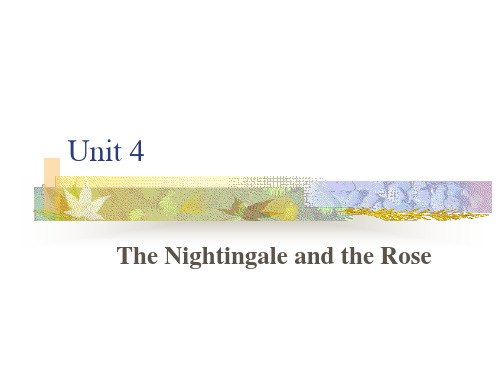
2. for want of: for the lack of For want of a better word, let’s call it Mefirstism. (As I can’t think of a better word, let’s call it me-firstism.) For want of something better to do she decided to try gardening. (As she could not find anything more interesting to do, she decided to try gardening.)
Quotes from Wilde
We are each our own devil, and we make this world our hell. The Duchess of Padua. The world is a stage, but the play is badly cast. Lord Arthur Savile's Crime. To love oneself is the beginning of a life-long romance. Phrases and Philosophies for the Use of the Young. Young men want to be faithful and are not; old men want to be faithless and cannot. The Picture of Dorian Gray.
Oscar O’Wilde
(1854-1900)
Oscar O’Wilde
全新版大学英语第二册第四册unit 4
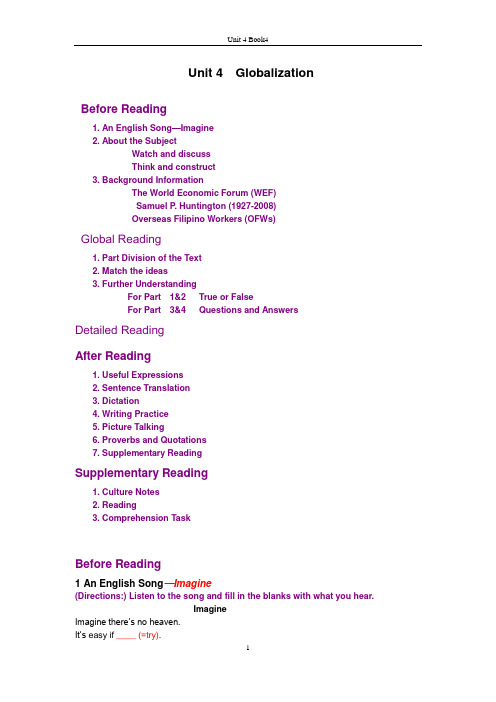
Unit 4 GlobalizationBefore Reading1. An English Song—Imagine2. About the SubjectWatch and discussThink and construct3. Background InformationThe World Economic Forum (WEF)Samuel P. Huntington (1927-2008)Overseas Filipino Workers (OFWs)Global Reading1. Part Division of the Text2. Match the ideas3. Further UnderstandingFor Part 1&2 True or FalseFor Part 3&4 Questions and AnswersDetailed ReadingAfter Reading1. Useful Expressions2. Sentence Translation3. Dictation4. Writing Practice5. Picture Talking6. Proverbs and Quotations7. Supplementary ReadingSupplementary Reading1. Culture Notes2. Reading3. Comprehension TaskBefore Reading1 An English Song—Imagine(Directions:) Listen to the song and fill in the blanks with what you hear.ImagineImagine there’s no heaven.It’s easy if____ (=try).No hell below us, above us only sky.Imagine all the people____ for today, ah (=living).Imagine there’s no country. It isn’t hard to do.Nothing to kill or die for, and no _____ too (=religion).Imagine all the people living life in ____ (=peace).You may say I’m a _____, but I’m not the only one (=dreamer).I ____someday you’ll join us, and the _____ will be as one (=hope, = world).Imagine no _______. I wonder if you can (=possessions).No need for greed or _____(=hunger).A brotherhood of man.Imagine all the people ______all the world (=sharing).You may say I’m a dreamer, but I’m not the only one.I hope someday yo u’ll join us, and the world will live as one.2. About the SubjectWatch and discuss(Directions:) Watch the video clip “No Logo: brands globalization resistance”and discuss within your group questions given.1. What information can you get from the video?2. What is picked out as an example of showing globalization? Tell it inyour own words.Think and construct(Directions:) In the following, there are some words and expressions.Think and construct new expressions related toglobalization. Chang its part of speech if necessary.economy, international, growth, trade, loans, global, workers, foreign, investment, marketplace, political, phenomenon, world, level(=Tips: Economic Phenomenon, Political Globalization, Foreign Markets, International Organizations, Foreign Investments, Trade Globalization, Foreign Loans, World Economy, Economic Growth, Global Economy, International Marketplace, International Trade, Foreign Workers, Economic Level)3.Background InformationThe World Economic Forum (WEF)The World Economic Forum: an independent, international organization incorporated as a Swiss not-for-profit foundation whose motto is “entrepreneurship in the global public interest”. It believes that economic progress without social development is not sustainable, while social development without economic progress is not feasible.(插入图片WEF2010)Themes:Arts and Culture, Business and Management, Economy, Environment, Global Issue, Humanities, Science, Medicine and TechnologyIndustries:Automobile, Aerospace & Defence, Technology, Banking, Business Services, Chemicals, Energy, Engineering and Construction, Financial Services, Healthcare, Information Technologies, Institutionals, Media, Communication and Entertainment, Multi-industries, Retail and Consumer Goods, Transport Services, Travel and TourismChina and the World Economic ForumChinese Vice Premier Li Keqiang attended the 2010 World Economic Forum (WEF) Annual Meeting opened in Davos, Switzerland. The links between China and the WEF started in 1979, when a Chinese delegation was invited to the forum for the first time. Since then, China has played a much greater role within the WEF, including hosting the summer session three times.Samuel Phillips Huntington (1927–2008) ---An American Political Scientist His C hronologyMassachusettsNationality AmericanFields Political scienceInstitutions Harvard UniversityAlma mater Stuyvesant High SchoolHarvard University University of ChicagoYale UniversityKnown for Clash of CivilizationsInfluenced Fukuyama, ZakariaOverseas Filipino Workers (OFWs)Filipinos who migrate to other nations to find employment or support their families in the Philippines.Each year, more than a million Filipinos leave to work abroad through overseas employment agencies and other programs, including government sponsored ones. Overseas Filipinos often work as doctors,physical therapists, nurses, accountants, IT professionals, engineers, architects, entertainers, technicians, teachers, military servicemen, students, caregivers, domestic helpers and household maids ,Money sent by OFWs back to the Philippines is a major factor in the country's economy, amounting to more than US$10 billion in 2005. This makes the country the fourth largest recipient of foreign remittances behind India, China, and Mexico. The amount represents 13.5% of the Philippines' GDP , the largest in proportion to the domestic economy among the four countries mentioned. Overseas Filipinos sent $15.9 billion worth of remittances to the Philippines in 2008,Global Reading1. Part Division of the Text2. Match the ideas(Directions:) In the text, there are many names and ideas mentioned. Scan and match the idea presented in Column B with the person in Column A. There are more names listed.Column A Column BBrowder believes that national identity makes no difference for him. (T)Alex Mandl is also a fervent believer in globalization. He never viewshimself as an American. (F)(=He sees himself as American without hesitation.)Davos man refer to the members of the international business élite who trek each year to the Swiss Alpine town for the annual meeting of the WorldEconomic Forum. (T)At the World Economic Forum, the issues discussed include everything frompost-election Iraq and HIV in Africa to the global supply of oil and theimplications of nanotechnology. (T)Professor Samuel Huntington describes Davos Man as an emerging global superspecies and a threat. (T)Questions and AnswersDid global trade exist in the past? What did people doing global trade think of it then? (=Yes, global trade has been around for centuries. In the past, the corporations and countries that benefited from global trade were largely content to treat vast parts of the world as places to mine natural resources or sell finished products.)What is Goldman Sachs’ prediction about the world economy in the future?(=It predicted that four economies — Russia, Brazil, India and China — will become a much larger force in the world economy than widely expected, based on projections of demographic and economic growth, with China potentially overtaking Germany this decade. By 2050, these four newcomers will likely have displaced all but the U.S. and Japan from the top six economies in the world. )Who does Manila Woman refer to?(=It refers to low-paid migrant workers from Asia and elsewhere who are increasingly providing key services around the world.)What is the major difference between Davos Man and Manila Woman?(=Unlike Davos Man, Manila Woman is strongly patriotic.)What does the author think Davos Man need to figure out?(=Davos Man needs to figure out how to strike a balance on a global scale between being international and being national at the same time.)Detailed ReadingText AGlobalization is sweeping aside national borders and changing relations between nations. What impact does this have on national identities and loyalties? Are they strengthened or weakened? The author investigates.In Search of Davos Man1Peter Gumbel1 William Browder was born in Princeton, New Jersey, grew up in Chicago, and studied at Stanford University in California. But don't call him an American. For the past 16 of his 40 years he has lived outside the U.S., first in London and then, from 1996, in Moscow,1This text is adapted from the January 31, 2005 issue of Time.where he runs his own investment firm. Browder now manages $1.6 billion in assets.2In 1998 he gave up his American passport to become a British citizen, since his life is now centered in Europe. "National identity makes no difference for me," he says. "I feel completely international. If you have four good friends and you like what you are doing, it doesn't matter where you are. That's globalization."2 Alex Mandl is also a fervent believer in globalization, but he views himself very differently. A former president of AT&T, Mandl, 61, was born in Austria and now runs a French technology company, which is doing more and more business in China. He reckons he spends about 90% of his time traveling on business. But despite all that globetrotting, Mandl who has been a U.S. citizen for 45 years still identifies himself as an American. "I see myself as American without any hesitation. The fact that I spend a lot of time in other places doesn't change that," he says.3 Although Browder and Mandl define their nationality differently, both see their identity as a matter of personal choice, not an accident of birth3. And not incidentally, both are Davos Men, members of the international business élite who trek each year to the Swiss Alpine town for the annual meeting of the World Economic Forum, founded in 1971. This week, Browder and Mandl will join more than 2,200 executives, politicians, academics, journalists, writers and a handful of Hollywood stars for five days of networking, parties and endless earnest discussions about everything from post-election Iraq and HIV in Africa to the global supply of oil and the implications of nanotechnology. Yet this year, perhaps more than ever, a hot topic at Davos is Davos itself. Whatever their considerable differences, most Davos Men and Women share at least one belief: that globalization, the unimpeded flows of capital, labor and technology across national borders, is both welcome and unstoppable. They see the world increasingly as one vast, interconnected marketplace in which corporations search for the most advantageous locations to buy, produce and sell their goods and services.4 As borders and national identities become less important, some find that threatening and even dangerous. In an essay entitled "Dead Souls: The Denationalization of the American Elite," Harvard Professor Samuel Huntington describes Davos Man (a phrase that first got widespread attention in the 1990s) as an emerging global superspecies and a threat. The members of this class, he writes, are people who "have little need for national loyalty, view national boundaries as obstacles that thankfully are vanishing4, and see national governments as residues from the past whose only useful function is to facilitate the élite's global operations." Huntington argues that Davos Man's global-citizen self-image is starkly at odds with the values of most Americans, who remain deeply committed to their nation. This disconnect, he says, creates "a major cultural fault line5. In a variety of ways, the American establishment, governmental and private, has become increasingly divorced from the American people."2Browder now manages $1.6 billion in assets.: Right now there are $1.6 billion worth of assets under Browder’s management at his investment firm.3both see their identity as a matter of personal choice, not an accident of birth: both believe it is themselves, not the place of their birth, that decides their identity4view national boundaries as obstacles that thankfully are vanishing: regard national boundaries as obstacles that are disappearing, which is a piece of good news for them5a major cultural fault line: an important line dividing a culture into two camps, which is likely to cause problems5 Naturally, many Davos Men don't accept Huntington's terms. Klaus Schwab, the founder and executive chairman of the World Economic Forum, argues that endorsing a global outlook does not mean erasing national identity. "Globalization can never provide us with cultural identity, which needs to be local and national in nature."6 Global trade has been around for centuries; the corporations and countries that benefited from it were largely content to treat vast parts of the world as places to mine natural resources or sell finished products. Even as the globalization of capital accelerated in the 1980s, most foreign investment was between relatively wealthy countries, not from wealthy countries into poorer ones. U.S. technology, companies and money were often at the forefront of this movement.7 However the past two decades have witnessed the rise of other significant players. The developed world is beating a path to China's and India's door — and Chinese and Indian companies, in turn, have started to look overseas for some of their future growth. Beijing has even started what it calls a "Going Out" policy that encourages Chinese firms to buy assets overseas. Asian nations are creating "a remarkable environment of innovation," says John Chambers, chief executive of Cisco Systems. "China and India are graduating currently more than five times the number of engineers that we are here in the U.S." That means that U.S. and European companies are now facing high-quality, low-cost competition from overseas. No wonder so many Western workers worry about losing their jobs. "If the issue is the size of the total pie, globalization has proved a good thing6," says Orit Gadiesh, chairman of consultants Bain & Co. "If the issue is how the pie is divided, if you're in the Western world you could question that.7"8 The biggest shift may just be starting. A landmark 2003 study by Goldman Sachs predicted that four economies — Russia, Brazil, India and China — will become a much larger force in the world economy than widely expected, based on projections of demographic and economic growth, with China potentially overtaking Germany this decade. By 2050, Goldman Sachs suggested, these four newcomers will likely have displaced all but the U.S. and Japan from the top six economies in the world.9 It's also entirely possible that the near future may see the pendulum of capital swing away from Davos Man-style globalization. One counterpoint is Manila Woman — low-paid migrant workers from Asia and elsewhere who are increasingly providing key services around the world. Valerie Gooding, the chief executive of British health care company BUPA, says the British and U.S. health care system would break down without immigrant nurses from the Philippines, India, Nigeria and elsewhere. Unlike Davos Man, she says, they're not ambivalent about being strongly patriotic.10 Not all Davos Men seek global markets, either. Patrick Sayer runs a private equity firm in France called Eurazeo, and complains there are still too many barriers to cross-border business in Europe, let alone the world. So he's focused Eurazeo on its domestic market. "I profit from being French in France. It's easier for me to do deals," Sayer says. "It's the same elsewhere. If you're not Italian in Italy, you won't succeed."6If the issue is the size of the total pie, globalization has proved a good thing: Globalization is good in that it helps make the pie bigger.7If the issue is how the pie is divided, if you're in the Western world you could question that.: When it comes to the question of how the pie is divided, Westerners could worry that non-Westerners might begin to take away a bigger share of the pie.11 That may sound like a narrow nationalism, yet it contains a hidden wisdom. Recall that Italy itself was, until 1861, not a unified nation but an aggregation of city-states. Despite tension between its north and south, there's no contradiction between maintaining a regional identity and a national one. Marco Tronchetti Provera, chairman of Telecom Italia, for example, can feel both Milanese and Italian at once, even as he runs a company that is aspiring to become a bigger international presence. The question is whether it will take another 140 years for Davos Man to figure out how to strike the same balance on a global scale.1. Difficult SentencesBrowder now manages $1.6 billion in assets.What information can you get from the sentence?(=Browder is quite a rich businessman and right now there are $1.6 billionworth of assets under at his investment firm.)2. Translate the sentence into Chinese(=布劳德如今掌管着价值16亿美元的资产。
大学英语第二册第4课课文及课后答案

北京工商大学专升本会计学专业大学英语2 电子版复习课件整理:王和平QQ 359076395 如果有发现错误或补充请XXX我.谢谢大家所有资料bbb://wangli12a.blog.163aaa 都可以下载UNIT 4XXX想在上大学之前先挣点钱,便申请了一份教学工作。
可是面试情况却越来越糟…我的第一份工作在我等着进大学时,我从一家当地报纸上看到一则伦敦郊区的一所学校要招聘一名教师的广告,此地离我的住处大约十英里远。
因为很缺钱花,又想做一点有益的事情。
于是我提出了申请,与此同时,我也很担心,因为即没有文凭,又没有教学经验,看来要想得到这份工作,机会渺茫。
可是,三天后来了一封信,让我去克洛伊顿面试。
那是一次令人难受的旅程。
搭火车到克洛伊顿车站,然后坐十分钟的汽车,最后至少再走四分之一英里。
结果,我在一个炎热的六月的早晨到了,因为太沮丧而没感到紧张。
学校是一座红砖房子,大大的窗子。
前面的宅院是铺着砾石的正方形,四个角落都各生一丛灌木,它们挣扎着求生于来自一条繁忙大道的烟雾,尘灰。
很显然开门的是校长本人。
他又矮又胖,留着沙色的小胡子,前额上布满皱纹,头发几乎秃光。
他带着一种吃惊的、不满的神情看着我,就像是一位上校看着一名没系鞋带的列兵一样,“哦,对”他咕哝着说“你最好到里面来。
”狭窄、阴暗的走廊里散发出放久的卷心菜的霉味,让人很不舒服,墙上墨迹斑斑,很脏;到处一片沉寂。
从地毯上的面包屑判断,他的书房也是他的餐室。
“你最好坐下,他说道,接着又问我了一连串的问题,为了得到普通中学毕业证书我学了哪些科目,多大了,玩些什么游戏,这时他突然用那双满是血丝的眼睛盯着我,问我是否认为游戏对于孩子的教育起着重大的作用。
我含含糊糊地说些别把游戏看得那么重要之类的话。
他哼了哼。
我的话不正确。
我和那位校长显然没什么共同点。
他说,学校包括一个有二十四个男孩子的班级,年龄范围是七至十三岁。
我必须教所有的课程,除了美术由他自己教外。
现代大学英语精读第二版 第四单元课件

Warming up Questions / Activities
CIA中央情报局
• Central Intelligence Agency • Mainly for gathering secret information that may bear on national
security • Created in 1947 • The CIA also coordinates the activities of the United States
1. spy 2. espionage 3. international spy 4. double agent 5. secret agent 6. secret service 7. special agent 8. intelligence 9. intelligence agency 10. counterintelligence agency 11. spy movies 12. detective stories 13. undercover agent or
• What is a spy like? What is your general impression of a spy? Look at the prompts (提 示) and pictures on the next slide and try to think of as many words as possible to describe people who work as a secret agent.
intelligence community, which includes agencies such as the Defense Intelligence Agency (DIA) and the National Security Agency (NSA). • In addition, the CIA takes overall responsibility for gathering information from other U.S. intelligence agencies, analyzing the separate pieces of information from each source, and providing a recommendation to the president of the United States and the president’s advisers.
现代大学英语第二版第二册

look it up in dictionary
beyond
?except ?e.g. ?除了你告诉我的,我对此一无所知。 ?I don't know anything about this beyond
what you told me. ?他除了退休金外没有其他收入。 ?He had no other income beyond his
may misjudge the present situation. ?冷战的思维仍旧在起作用,双方都错误的判断了
当前的局势。
as it is though
?although, as it turns out/ in reality ?e.g. ?I had hoped to complete my essay today,
?the same applies to/ is true for sb/sth ?e.g. ?If you want others to take you as a friend,
you must show them your respect and understanding. This goes for international relations as well.
?-免税的 ?Our food used to be pollution-free. ?-无污染的 ?They claim their city to be housefly-free. ?-无蝇
hay, weed, reed
?hay: long animals.
grass,
cut
and
dried
?36-inch-wide ?20-year-old ?2-meter-deep ?500-page-thick ?7000-meter-high ?800-mile-long ?100-story-high ?a 3-meter-tall tree
现代大学英语精读2第二版Unit-2-Say-Yes

2021/3/10
5
Part One
Say Yes
2021/3/10
ENTER 6
Warm-up
I. On the Origin of Racism II. Enjoy a Song III. Enjoy a Poem (for reference) IV. Make up a Story
2021/3/10
To be continued on the next page.
12
II. Listen to a Song
Love is Color-Blind
I remeber as a young boy I watched my neighbourhood go up in flames I saw the whole thing thru tears of pain and a situation's rackin' my brain I wish I could fly away and never come back again we need some love y'all we need some real deal help from above y'all I mean the kids watchin' and I just can't see it stoppin', I don't understand I mean we all bleed the same blood, man!
Yeah, it's time for some changes
2021/3/10
To be continued on the next page.
- 1、下载文档前请自行甄别文档内容的完整性,平台不提供额外的编辑、内容补充、找答案等附加服务。
- 2、"仅部分预览"的文档,不可在线预览部分如存在完整性等问题,可反馈申请退款(可完整预览的文档不适用该条件!)。
- 3、如文档侵犯您的权益,请联系客服反馈,我们会尽快为您处理(人工客服工作时间:9:00-18:30)。
To be continued on the next page.
Lesson 4—The Nightingale and the Rose
I.
Author
January 1893, Babbacombe Cliff
My Own Boy, Your sonnet is quite lovely, and it is a marvel that those red-roseleaf lips of yours should be made no less for the madness of music and song than for the madness of kissing. Your slim gilt soul walks between passion and poetry. I know Hyacinthus, whom Apollo loved so madly, was you in Greek days. Why are you alone in London, and when do you go to Salisbury? Do go there to cool your hands in the grey twilight of Gothic things, and come here whenever you like. It is a lovely place and lacks only you; but go to Salisbury first. Always, with undying love, Yours, OSCAR
W B T L E
To be continued on the next page.
Lesson 4—The Nightingale and the Rose
I.
Author
Discuss in groups!
Criticism a man of far greater originality and power of mind than many of the apostles of aestheticism undoubted talents in many directions as a typical aesthete that he kept himself before the notice of the public a poet of graceful diction a playwright of skill and subtle humor a dramatist whose plays had all the characteristics of his conversations
W
B
T
L
E
To be continued on the next page.
Lesson 4—The Nightingale and the Rose
I.
Author
A novel of his, “The Picture of Dorian Gray”, attracted much attention, and his sayings passed from mouth to mouth as those of one of the professed wits of the age. When he became a dramatist his plays had all the characteristics of his conversations. His first piece, Lady Windermere's Fan, was produced in 1892. A Woman of No Importance followed in 1893. An Ideal Husband and The Importance of Being Earnest were both running at the time of his disappearance from English life. The revelations of the criminal trial in 1895 naturally made them impossible for some years. Recently, however, one of them was revived, though not at a West End theater.
Lesson 4—The Nightingale and the Rose
Part Two
W
B
T
L
E
ENTER
Lesson 4—The Nightingale and the Rose
Background Information
I. II.
Author Art for Art’s Sake
W
B
T
L
E
Lesson 4—The Nightingale and the Rose
I.
Author
Oscar Wilde, the son of the late Sir William Wilde, an eminent Irish surgeon. His mother was a graceful writer, both in prose and verse. He had a brilliant career at Oxford, where he won the Newdigate Prize for English verse for a poem on Ravenna. Even before he left the University in 1878 Wilde had become known as one of the most affected of the professors of the aesthetic craze, and for several years it was as the typical aesthete that he kept himself before the notice of the public.
W B T L E
To be continued on the next page.
Lesson 4—The Nightingale and the Rose
I.
Author
Oscar Wilde’s works
On Writing Well: The Classic Guide to Writing Nonfiction (now in its 25th anniversary edition), as well as Writing to Learn, How to Write a Memoir, Speaking of Journalism, Writing About Your Life: A Journey to the Past and Inventing the Truth: The Art and Craft of Memoir.
W B T L E
To be continued on the next htingale and the Rose
I.
Author
In the summer of 1891, Oscar met Lord Alfred “Bosie” Douglas, the third son of the Marquis of Queensberry. Bosie was well acquainted with Oscar's novel, Dorian Gray and was an undergraduate at Oxford. They soon became lovers and were inseparable until Wilde's arrest three years later. In April 1895, Oscar sued Bosie's father for libel on the charge of homosexuality. Oscar withdrew his case but was himself arrested and convicted of gross indecency and sentenced to two years of hard labor.
W B T L E
To be continued on the next page.
Lesson 4—The Nightingale and the Rose
I.
Author
Savoy Hotel, London
Dearest of all Boys, Your letter was delightful, red and yellow wine to me; but I am sad and out of sorts. Bosie, you must not make scenes with me. They kill me, they wreck the loveliness of life. I cannot see you, so Greek and gracious, distorted with passion. I cannot listen to your curved lips saying hideous things to me. I would sooner be blackmailed by every rent-boy in London than to have you bitter, unjust, hating. You are the divine thing I want, the thing of grace and beauty; but I don't know how to do it. Shall I come to Salisbury? My bill here is 49 pounds for a week. I have also got a new sitting-room over the Thames. Why are you not here, my dear, my wonderful boy? I fear I must leave; no money, no credit, and a heart of lead. Your own, OSCAR
